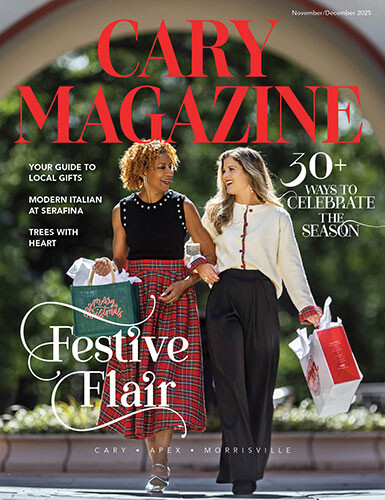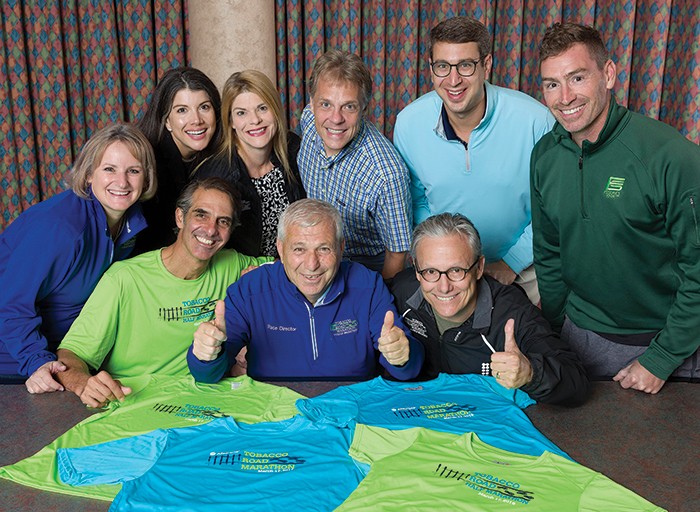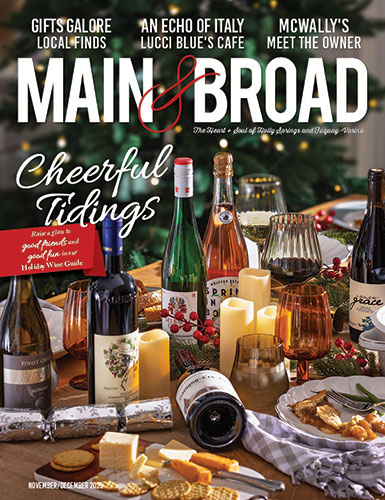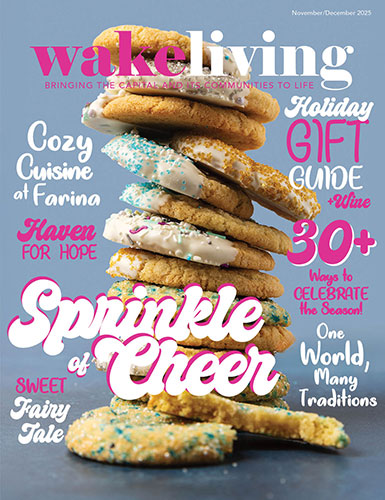Nine years. Ten races. One million dollars raised.
The goal will be within reach for the Tobacco Road Marathon when runners take off down the trail on Sunday, March 17.
Over the past few years, organizers of the Tobacco Road Marathon have given out well over $100,000 each year to charity, with roughly $920,000 distributed since the marathon’s first year, says Mark Dill, a board member and chief marketing officer for the marathon.
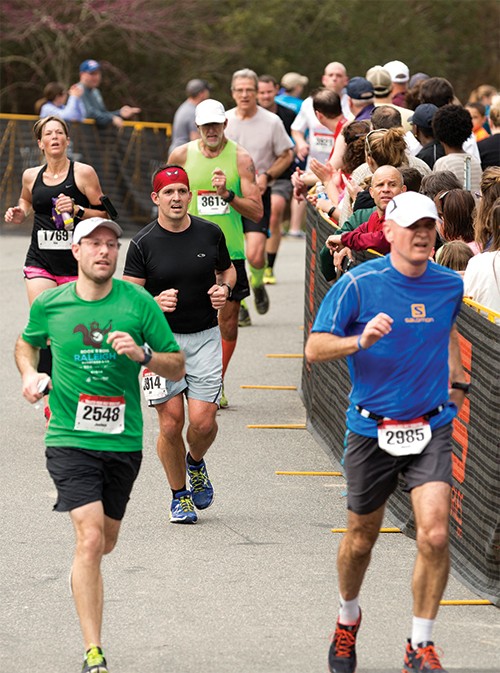
Contributed photo
Tobacco Road Marathon
7 a.m., Sunday, March 17
Start and finish at the USA Baseball/Thomas Brooks Park
Sign up for a marathon or half marathon at tobaccoroadmarathon.com.
Cary Magazine readers get a $20 discount with the code CARYMAG.
“Given the last several years, we’ve exceeded $100,000 raised. There’s no question we’re going to come away with more than $1 million total after the event in March,” he said.
It all began with Kazem Yahyapour, the marathon’s founder and now president of the board of directors. He’d suffered a heart attack in his 40s and was out of shape. His doctors told him that he had a choice to make. Both his father and grandfather had died from heart disease in their 40s, and he didn’t want to end up the same.
He trained for and ran his first 5K, and immediately decided to run a marathon. He completed the Myrtle Beach Marathon in February 2004, followed by several more.
“He’s one of those guys, he makes up his mind to do something, and he does it,” Dill said.
Yahyapour’s time from one of those early marathons qualified him to run the Boston Marathon, something many runners spend years working up to, Dill says.
Yahyapour ran the Boston Marathon in 2005, and soon after, he founded his first race. The Wakefield High School 5K launched in 2006 with the goal of raising money to build awareness of the dangers of drinking and driving and drug use. Yahyapour also served for several years on the board for Raleigh’s City of Oaks Marathon.
With his experience, and a desire for a local spring marathon to raise money for outstanding charities, Yahyapour launched the Tobacco Road Marathon in 2010. Today the nonprofit event remains the Triangle’s only full marathon in the spring. The Triangle hosts several half marathons at that time of year, Dill says. But that’s just part of the reason that the nonprofit is about to reach the $1 million mark in total funds raised.
Another reason is the commitment of the organizers and partners of the marathon, which is organized and staffed by volunteers. The total number of volunteers is upwards of 700, and the marathon’s beneficiaries are among them.
Chris LaTurno, executive director of the Triangle/Eastern North Carolina chapter of JDRF (Juvenile Diabetes Research Foundation), one of those beneficiaries, has run the marathon himself and says his group provides about 60 volunteers annually for the race.
He isn’t surprised that fundraising is about to reach the $1 million mark.
“I think a lot of people probably would have thought that’s an improbable number,” he said. “But you meet those guys and gals over there just one time, and there’s no surprise.
“They are dynamic, caring, strategic, supporting. I give them so much credit for working so hard year-round to make that a possibility.”
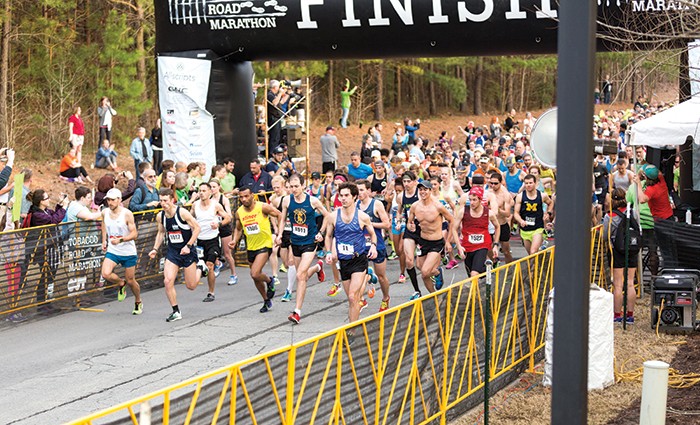
Contributed photo
JDRF has received $250,000 directly from marathon organizers over five years, LaTurno says, and the total donations generated by the marathon for JDRF is even greater. Individual runners use the Tobacco Road Marathon as their own personal fundraising tool, taking pledges to run. These individual donations have added another $75,000 in donations to JDRF, bringing the total to $325,000 over the years.
A true partnership, JDRF provides regular reports to the board of directors for the Tobacco Road Marathon. Dill recalls when board members met a boy living with Type 1 diabetes, who had received a mechanical pancreas made possible through research funded by JDRF.
“My eyes kind of welled up,” Dill said. “When you see a little 8-year-old boy, and that treatment was developed through JDRF research which wouldn’t be possible without charitable contributions – that was powerful, and I was grateful that they brought the boy in.”
Money raised by the marathon also has benefited the American Red Cross and Hope for Warriors, a Virginia-based organization supporting military personnel and their families, Dill says.
The race – which includes a marathon and a half-marathon option – traces the American Tobacco Trail, starting in Cary and stretching through parts of Durham and Apex.
“It’s just a great experience,” he said. “We tell people this is fast, flat and fun.”
The lack of hills and downhill finish makes it a fast course which is popular with runners. Last year, about 4,000 runners completed the marathon and half-marathon, up from about 2,500 runners in 2010.
About 15 percent qualify for the Boston Marathon, which Dill says is considered the holy grail for amateur runners.
Post-race time is a party, with live music, craft beer and food.
“It creates a really good vibe, and people hang out at the party and swap stories,” Dill said.
Registration for the 2019 marathon and half-marathon is still open and available through the Tobacco Road Marathon’s website at tobaccoroadmarathon.com.
- 2019 Maggy Awards: Services
- 2019 Maggy Awards: Restaurants
- 2019 Maggy Awards: Shopping
- 2019 Maggy Awards: Lifestyle
- Exam Room to Legislative Floor
- Hands On
- The Early Spring of Winter Honeysuckle
- Cary’s SideBar: Classic with a Twist
- Liquid Assets: Acorn Brown Ale from Jordan Lake Brewing Company
- Liquid Assets: Oak City Amaretto
- Picture Perfect!
- Sorghum-Spiked Challah French Toast from Postmaster
- Tobacco Road Marathon
- From the Editor: January 2019
